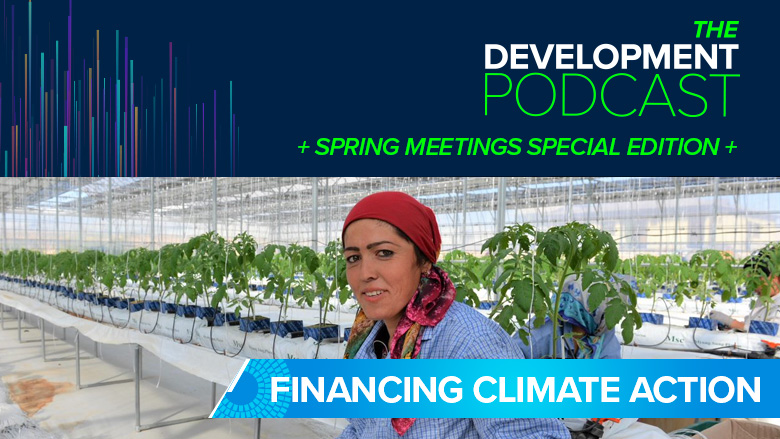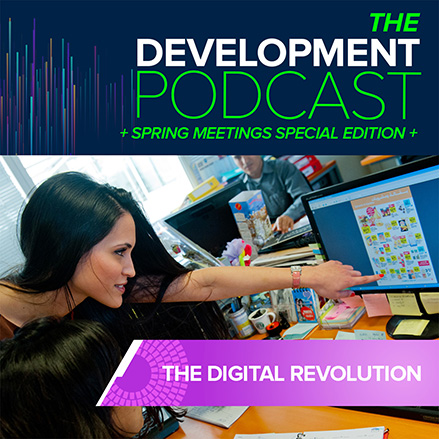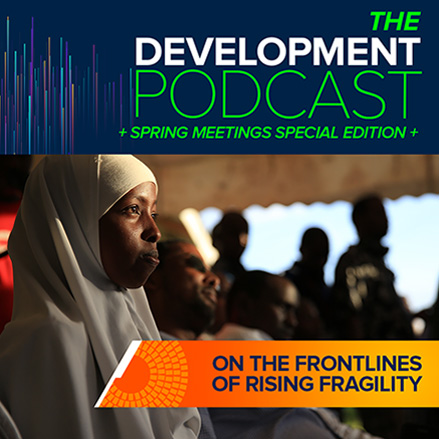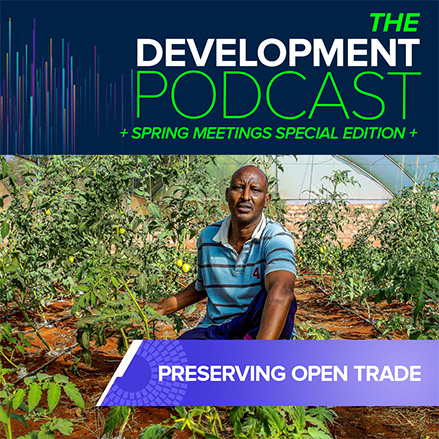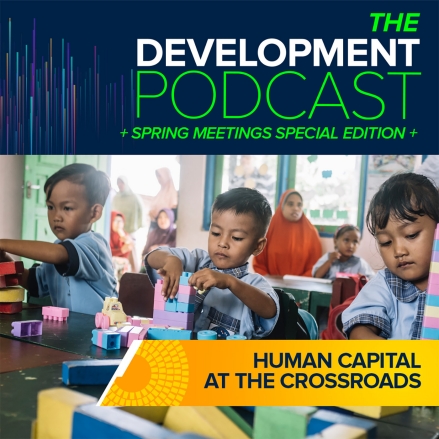The connection between development and climate change is increasingly clear: delivering on these together will require large-scale low-carbon and resilient investments. It will also require approaches that tackle the political economy of the low-carbon transition and help communities build long-lasting resilience to climate change. What are the investments needed to achieve a green, resilient and sustainable future? How can we unlock private finance for climate action? How are countries stepping up to the challenge?
During the 2022 World Bank Group-IMF Spring Meetings, we explored the actions that are needed to create enabling environments, leverage different pools of capital at the right time, for specific needs, while involving communities and bringing them along in the global low-carbon, resilient transition. World leaders came together to discuss how to best build resilience & manage uncertainty. Listen to the Spring Meetings highlights in a special series of The Development Podcast.
Tell us what you think of our podcast here >>>. We would love to hear from you!
Featured Voices
- Rania Al-Mashat, Minister of International Cooperation, Arab Republic of Egypt
- Rhian-Mari Thomas, Chief Executive, Green Finance Institute
- Nicholas Stern, IG Patel Professor of Economics and Government, London School of Economics
- Mari Pangestu, Managing Director, Development Policy and Partnerships, World Bank
- Makhtar Diop, Managing Director, IFC
Transcript
[00:00] Ntombie Siwale: Welcome to a special edition of The Development Podcast from the World Bank Group. I'm Ntombie Siwale. This is the second of five episodes recapping the World Bank Group IMF-Spring Meetings. This year's discussions took place as the world dealt with overlapping crisis and conflicts, and the focus was on how countries can best manage uncertainty and build resilience. Today, financing a climate smart future for all countries.
Rania Al-Mashat: We cannot think about climate as separate from the development process of the country.
Rhian-Mari Thomas: We clearly need that enabling policy and regulatory frameworks in country, as well as the mechanisms to improve credit worthiness so that we can secure both local and international funds.
Ntombie Siwale: What it will take to advance climate action, especially at a time of tightening fiscal constraints.
Lord Nicholas Stern: We have to put in place a big transition and we have to do it now, and of course, exiting coal, moving away from coal, absolutely core part of that. It's the lowest hanging fruit, and that will involve a great deal of investment, but we're going to have to adapt.
Ntombie Siwale: That's all in The Development Podcast in the next 25 minutes.
[02:10] This year's Spring Meetings gathered global leaders to share solutions for an increasingly fragile world, and climate change was one of the key points of focus. There isn't a country that's not impacted by climate change, but the effect on developing economies, whether through flooding, food insecurity, loss of land or other effects is much worse. The latest UN report from the IPCC released in March stated that almost 40% of the world's population is highly vulnerable to the impacts of climate change. So what's next? COP 27 will be hosted in Egypt at the resort of Sharm el-Sheikh, and Rania Al-Mashat, minister of international cooperation, told Makhtar Diop, managing director and executive vice president at the International Finance Corporation, how she sees her country's presidency of the event unfolding and her priorities to create meaningful solutions for the future.
Rania Al-Mashat: Egypt's presidency is focusing on three main messages. First are impartiality, even though we are an African nation, but this is a COP for the world so we're trying to maintain that. Second, as you correctly mentioned, adaptability, adaptation and resilience, extremely important for many developing countries. And the latest crisis we're seeing, Ukraine-Russia, has brought to the forefront again the importance of food security and everything that is related to that. And then third, it's going to be what we hope is an implementation COP, so how can we move from the pledges to implementation and to action? So those are the three key messages out of Egypt, and hopefully to be materialized next November in Sharm el-Sheikh.
Makhtar Diop: Well, minister, as you said, there were a lot of pledges in COP 26, and now, we want to see execution. I know that energy transition is very high on your agenda, water security is another important part of your agenda, but also everything related to adaptation, which is sometimes a bit overlooked in the conversation. So tell us a little bit what the private sector can do to support all these priorities.
Rania Al-Mashat: You know what? Let me first acknowledge IFC's important role in mobilizing private sector and pushing private sector investments in countries. COP aside, the work that is being done to actually engage private sector is important. In our case, the energy transition started several years ago and when we take a look at the integrated sustainable energy strategy that had very clear KPIs for renewable energy in the country, the government did structural reforms, which were very, very important to be able to crowd in private sector investments, and that is when the IFFC and many other institutions were also able to bring in their investments to support the energy transition. And this has brought together a very successful project, the Benban project, one of the biggest solar plants in the region, and these are examples that can be replicated in other countries as well.
Rania Al-Mashat:They show how different stakeholders can come together. Governments have a role to play in terms of regulatory and legislative reforms, the private sector's willingness, but also the IFIs, whether in terms of financing or technical capacity. In our case, Egypt has finished its 2050 climate strategy, and as you correctly point out, it includes the plans to move to our NDCs by 2050 across different sectors, be it agriculture, transportation, and many others. And the idea of the 2050 climate strategy is that it is not divorced from development, and that's why also with the World Bank Group, we are pushing or we are one of the pilot countries with the CCDR, the Country Climate Development Report, because we cannot think about climate as separate from the development process of the country. And that's why there's a lot of integration between the different sectors and the different targets.
Makhtar Diop: You talked about regulation, you talked about a certain number of things that needs to be done, but one of the things that we are hearing very much from the private sector is green taxonomy. People want to know when they invest to support a fight against climate change, that is really targeted to activities which are related to that. So what is your view about green taxonomy?
Rania Al-Mashat: I think it's absolutely correct. The climate conversation is a multi-stakeholder conversation. It includes governments, private sector, citizens, as well as the international community, and that's why it's very important from the government's side to have a clear vision, to communicate it, and if there are any legislative impediments for private sector engagement, try and address those. Also very important are the innovative types of financing, and one of the achievements of Glasgow was private sector engagement was very, very high on the agenda and we saw lots of commitments from private sector entities, and the point is, now, how can we take these pledges into implementation?
Rania Al-Mashat: And that requires all of us working together to be able to create de-risking opportunities for the private sector through innovative tools, blended tools, and so forth. And there's a wealth of experience, be it at the IFC, at EBRD, other institutions, that have actually showcased projects, whether mitigation or adaptation in emerging markets and middle income countries, and these are examples that we want to be able also to showcase and replicate. And it also addresses the green taxonomy that you just mentioned because it gives comfort or confidence that whatever target is set by the government and the private sector is able to come in, that that also is achievable.
Ntombie Siwale: Rania Al-Mashat, Egypt's minister of international cooperation, speaking to Makhtar Diop, managing director and executive vice president at the IFC.
[07:56] Ntombie Siwale: To explain just how urgent the action needs to be, let's pick up with Mari Pangestu, managing director of development policy and partnerships at the World Bank, and her guest, Lord Nicholas Stern, IG Patel Professor of Economics and Government at the London School of Economics. They spoke about the tangible ways that climate financing can work for a solutions based future. Lord Stern began by explaining the significance of the latest IPCC report.
Lord Nicholas Stern: The IPCC report is clear and strong. Each one that comes through is more worrying than the one that came before as the evidence accumulates and accumulates. We're headed for something closer to three degrees than two degrees. We haven't been at three degrees for 3 million years. The sea levels would be 10 to 20 meters higher, threatening our coastal cities and habitations in a very deep and difficult way. We would risk extreme events which together with those long onset stories, would push hundreds of millions, perhaps billions to move. Let's be very clear about the scale of the risks and that we have to act very quickly and strongly starting now in this decade if we are to be able to handle those risks in a way that could be acceptable. And poor people of course are hit earliest and hardest. So what do we have to do?
Lord Nicholas Stern: Well, we have to invest strongly in doing things differently. What things? Particularly the energy sector. We have to put in place a big transition and we have to do it now, and of course, exiting coal, moving away from coal, absolutely core part of that, it's the lowest hanging fruit. And that will involve a great deal of investment, but we're going to have to adapt also as we do this and we're going to have to invest in our natural capital as well.
Lord Nicholas Stern: Fortunately, if we put all those things together, the investment in emissions reductions and the new energy story, if we adapt, if we invest in our natural capital, we have a new model of development, much more attractive than the dirty destructive one that went before. We have cities where we can move and breathe, much more efficient use of all our resources, ecosystems which are robust and fruitful. It's a new model of development and it's in our hands, but we have to invest to get there.
Lord Nicholas Stern: How much? Well, in emerging markets and developing economies, perhaps 1.5 to $2 trillion a year extra by 2030, perfectly possible from the point of view of world macro and past historical rates of investment, but a major increase in investment. And that 1.5 to $2 trillion a year in 2030, or by 2030, would have to be financed domestically and internationally, perhaps internationally, something close to a trillion dollars a year extra, big majority private sector, but that will be enabled by public sector resources or financial resources which come with it and combine together.
Lord Nicholas Stern: We have to reduce, share, manage risk in a way that allows the private sector to come in and brings down the cost of capital, and clearly, the MDBs have a crucial role. So also the bilaterals with their concession finance. And of course philanthropies, which although they'll be smaller in scale, can reach the parts that others can't reach, and they're the just transition and investing in people and places who were intensive in fossil fuels, that can play an important part as well, as could voluntary carbon markets.
Mari Pangestu: Thanks for that very sobering but realistic picture, but also identifying the opportunities. Another realism that we are facing today is of course the Ukraine war and its impact on high energy prices and increased concerns around energy security. You identified energy transition as one of the really urgent areas that we have to discuss. When you see the drivers that are happening now, how do you see us moving forward if we want to still continue to accelerate energy transition?
Lord Nicholas Stern: Well, energy security is very important and we've seen it in the past in the crises of the 1970s, and the right thing to do is to move away faster and harder from fossil fuels and to increase strongly energy efficiency. Actually now, our options for moving harder and faster away from fossil fuels are much bigger than they were in the 1970s because renewables and storage have proceeded so strongly. So that's the strategy. The implementation of the strategy means of course recasting energy supply, it means much bigger capacity for electricity because so much of this story is going to be around electricity in terms of course power itself, in terms of transportation, in terms of heating homes and so on. So we have to invest on the supply side and we have to encourage the demand side so it moves towards electrification, and of course, much greater energy efficiency.
Lord Nicholas Stern: So that's the delivery challenge. How do we get that to move? The right kind of policies have to be put in place, including abolition of fossil fuel subsidies, the advancement of carbon pricing, but clarity on time scales for decentralization of the grid, clarity on time scales for stopping the sale of the internal combustion engine vehicles and so on. Making sure that the sense of direction is clear in those ways, but also enabling in a much more efficient way the solution of problems and difficulties inevitably arise as we move into delivery. And of course, reforming domestic financial systems and getting the flows of finance right as I described just now. That's the essence of what we call the country platform approach, and through its climate change development reviews, I do believe that the world bank is moving in a positive way in that direction.
Ntombie Siwale: That was Mari Pangestu, managing director of development policy and partnerships at the World Bank, and her guest, Lord Nicholas Stern, IG Patel Professor of Economics and Government at the London School of Economics. A reminder, you're listening to a special Spring Meeting edition of The Development Podcast from the World Bank Group with me, Ntombie Siwale.
Multiple speakers: Namaste. I'm Shin Kiram in New Delhi. / [foreign language]. I'm Muslim Sidhi Muhammed in Niamey, Niger. / Hello, [foreign language], everyone. I am Lay Sunde in Port Vila, Vanuatu. / Hello. I'm Pitom Kov in Phnom Penh, Cambodia. / [foreign language], I am Mampumza Esta in Uganda, at the World Bank Group-IMF Spring Meetings. / World Bank Group-IMF Spring Meetings. / World Bank Group-IMF Spring Meetings. / The World Bank Group-IMF Spring Meetings.
[15:20] Ntombie Siwale: Effective financing of climate action will require the investment of trillions of dollars and the involvement of the private sector, so let's find out a bit more about how business can play a key role in driving this forward. Makhtar Diop, Managing director of the International Finance Corporation led another discussion on the role of private capital in supporting climate action. He spoke to Rhian-Mari Thomas, CEO of the Green Finance Institute. She began by explaining how she saw the achievements of COP 26 in Glasgow.
Rhian-Mari Thomas: I think one of the things that we discussed in Glasgow was this point about the right kind of capital into the right kind of climate investment opportunities, and that really should be the tagline for financing the whole of the zero carbon transition. I think it really perfectly captures the task at hand, which is about creating the opportunities for finance providers to fund the transition in a way that meets their risk adjusted returns hurdle, so removing the barriers so that capital can flow. And those barriers can take many forms as we know but as we're talking about risk and rewards, let's focus on possible solutions to removing financial barriers, and you've kindly invited me to give an example of the work that we've been doing and I'd love to share an anecdote about the work that we've been doing in South Africa with the South African banks and the investors.
Rhian-Mari Thomas: The banks there are facing a specific barrier, which is that the deep pools of pension capital in South Africa need to invest in investment grade securities such as a government bond, and so that often exempts them from investing in much needed energy, waste and water infrastructure in response to climate change. So by providing a de-risking facility that would partially guarantee the debt needed to fund those transactions, the banks would be able to provide finance at competitive rates, antennas, confident that they could then syndicate that to local domestic pension and institutional funds. So we've developed a novel green finance guarantee fund with partners in the UK and in South Africa that can provide that de-risking, and also importantly, we've structured that fund so that it would include government funding, development bank funding and private capital, all deployed together so that each type of finance provider receives the returns that they're seeking in line with their mandate. In the course of developing this fund, we uncovered over a billion pounds worth of climate smart infrastructure projects that the banks would consider funding, if only they had the benefit of this guarantee solution.
Rhian-Mari Thomas: So just finally, the reason I'm particularly excited about this project is that whilst South Africa is the perfect jurisdiction for a proof of concept such as this, it's an entirely replicable solution in other countries. So if we can identify the situations where with some de-risking, we can crowd in private capital, we're not only leveraging scarce government balance sheet in those transactions, we're also freeing up government development capital for those situations where it's more challenging to create a commercial case. So for example, to fund certain adaptation measures, but then that's a whole other topic for us to discuss.
Makhtar Diop: And you said something quite interesting, Rhian, earlier. You insisted on what needs to be done in emerging economies and you give some examples. You talked about South Africa and I'm sure that you have some other countries in mind. So what will it take today if we want to mobilize more resources from emerging economies? Especially, I think, that there will be a lot of sensitivity about social bonds, linking environment with social inclusion. So tell me what you think about that.
Rhian-Mari Thomas: I'd be happy to. I think as a broad comment, I'd say this is really a challenge of leadership and collaboration, and it's across all economies, not only emerging markets. And whilst I mentioned earlier a financial mechanism that channels government capital efficiently alongside development and private capital in order to create lending and investment opportunities for local banks and investors, but we can't solve for a one and a half degree aligned world purely through financial instruments. We clearly need that enabling policy and regulatory frameworks in-country, as well as the mechanisms to improve credit worthiness, so that we can secure both local and international funds. And as implied in your question, that they need to be led in-country by those who have a really detailed understanding of local conditions.
Rhian-Mari Thomas: And that's where organizations like the IFC, you've got 16 years of experience financing opportunities in emerging markets and developing economies. You have such an important role in continuing to familiarize both local and international mainstream finance institutions with the opportunity for commercial investments and helping overcome perceptions of risk. For example, very practically pointing at your historic default rates. So our research has also identified green banks as highly efficient vehicles in-country to channel domestic capital, both public and private capital, towards climate smart projects.
Rhian-Mari Thomas: And I guess finally, there aren't no intellectually coherent high carbon pathways to prosperity, the science and the recent IPCC report has been very, very clear on this, so building these collaborative initiatives and these institutions that involve policy makers, industry experts and financiers is absolutely key.
Makhtar Diop: It's very interesting to hear it, say by someone who's a scientist by training, you. A lot of people who don't know it but you are a scientists by training, so saying that it's not an exact science but we need to put together institutions so that people can work and create this social contract that mobilize everybody around these targets. But you have said something quite interesting, that we need to de-risk, we need to have partnership, public and private needs to work together. But there is something I haven't heard a lot about which seems to be coming more and more into conversation, is that maybe more investment in efficiency. You're talking about fighting against climate change by reducing emission, and hearing people going to COP 27, increasingly, I hear people talking about reducing the waste in networks, in electricity networks, reducing the leakages in water pipes, reducing all these inefficiencies that we have. What is your take on that?
Rhian-Mari Thomas: Well, I fully agree with you. Here at the Green Finance Institute, one of our flagship projects has been looking at the energy efficiency of buildings, which here in the UK, our building stock accounts for about a quarter of our emissions. And this is clearly a topic that really resonates with consumers, it resonates with the electorate, but finding ways of financing that upfront capital expenditure, that then enables people to have lower energy bills. And the same analogy in industry where you invest the CapEx up front in order to have the lower operating expenditure ongoing, these are real challenges that again needs financiers to be working closely with regulators, policy makers, in order to actually accelerate all of this. This is about both supply and demand. It's about efficiency, it's about using resources well and efficiently, as well as looking at our sources of demand and having more reliance on renewable energies and climate smart infra.
[23:27] Ntombie Siwale: Makhtar Diop, managing director of the International Finance Corporation, in a fascinating discussion with Rhian-Mari Thomas, CEO of the Green Finance Institute. We are almost at the end of today's edition of The Development Podcast, but before we go, let's return to Lord Nicholas Stern, IG Patel professor of economics and government at the London School of Economics for some concluding thoughts.
Lord Nicholas Stern: COP 26 was very good in setting a roadmap, setting the targets, the private sector involvement, the commitment to net zero, the rising place of adaptation of natural capital and so on. But COP 27 is the delivery COP, and that is very clear with our Egyptian friends and in their leadership, and of course, it's an African COP. In the priorities that we see on that delivery, surely the energy transition is very clearly there as one of the key priorities. Adaptation and resilience, we've seen how devastating climate change can be already with us, and it's going to get more difficult, so adaptation and resilience would be a second important priority. Integrating of course adaptation, resilience with emissions reductions, as we can through decentralized solar, through public transport, through mangroves and so on, we can put mitigation, adaptation, development together, and we must. And of course, finance. I've already indicated the scale of finance that we need. It's going to be critical to advance of commitment, advance of ambition.
Lord Nicholas Stern: So in that finance story, the private finance is going to be at center stage, but it will require reduction of risk, sharing of risk, management of risk. And in that story then, the combination with the bilaterals and the concessional money they can bring, the MDBs with the lower cost of capital and the skills they can bring and the management of risk are going to be enormously important, as will the philanthropies and the voluntary carbon markets.
Lord Nicholas Stern: Second part of delivery is getting behind those countries which are already making strong moves and putting their country platforms in place. I think particularly as South Africa, which has worked so hard to get its clear plan for transforming the economy in place, but other countries too. Indonesia and India and Vietnam are all moving very strongly. So countries that are coming forward, those are just examples, but other countries that are coming forward, we have to get behind them in the delivery story to show in those specific cases that the world is ready to get behind their investments.
[26:04] Ntombie Siwale: Lord Nicholas Stern with some rallying words. Thanks so much for listening to the special edition of The Development Podcast, recapping the key conversations from our Spring Meetings. Next time, we'll be exploring the particular challenges facing fragile states from Yemen to Ukraine. It'll be another great show so please do join us then. I'm Ntombie Siwale and the producer is Sarah Treanor. See you then.
ABOUT THE DEVELOPMENT PODCAST
This international development podcast brings together the data, research—and solutions—that can pave the way to a sustainable future. Through conversations focused on revealing the latest data, the best research, and cutting-edge solutions, let us introduce you to the folks working to make the world a better place. Don't miss an episode! Listen and subscribe for free on your favorite platform. And rate our show! ;)
Tell us what you think of our podcast here >>>. We would love to hear from you!
ABOUT THE WBG-IMF SPRING MEETINGS 2022
Preparing for future crises and strengthening international cooperation are essential to deliver a resilient recovery and a better future for those most in need. At these Spring Meetings, the World Bank Group convened leaders, experts and activists to discuss the impact of these global shocks on the most vulnerable communities.
ABOUT THE WORLD BANK GROUP
The World Bank Group is one of the world’s largest sources of funding and knowledge for low-income countries. Its five institutions share a commitment to reducing poverty, increasing shared prosperity, and promoting sustainable development.
